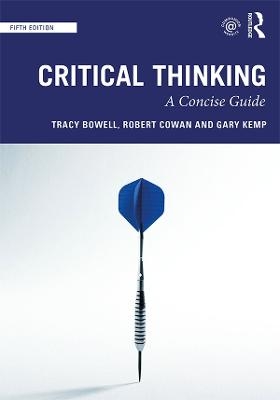
Critical Thinking
A Concise Guide
Seiten
2019
|
5th edition
Routledge (Verlag)
978-0-8153-7142-7 (ISBN)
Routledge (Verlag)
978-0-8153-7142-7 (ISBN)
Critical Thinking: A Concise Guide will equip students with the concepts and techniques used in the identification, analysis and assessment of arguments whatever the subject-matter or context. This fifth edition has been revised and extensively updated throughout.
We are frequently confronted with arguments. Arguments are attempts to persuade us – to influence our beliefs and actions – by giving us reasons to believe this or that. Critical Thinking: A Concise Guide will equip students with the concepts and techniques used in the identification, analysis and assessment of arguments whatever the subject matter or context. Through precise and accessible discussion, this book provides the tools to become a successful critical thinker, one who can act and believe in accordance with good reasons, and who can articulate and make explicit those reasons.
Key topics discussed include:
Core concepts in argumentation
How language can serve to obscure or conceal the real content of arguments
How to distinguish argumentation from rhetoric
How to avoid common confusions surrounding words such as ‘truth’, ‘knowledge’ and ‘opinion’
How to identify and evaluate the most common types of argument
How to distinguish good reasoning from bad in terms of deductive validity and induction.
This fifth edition has been revised and extensively updated throughout, including a significantly expanded range of ‘complete examples’, the introduction of Venn diagrams and the discussion of fake news and related phenomena arising in the contemporary scene.
The dynamic Routledge Critical Thinking companion website provides thoroughly updated resources for both instructors and students, including new examples and case studies, flashcards, sample questions, practice questions and answers, student activities and a testbank of questions for use in the classroom. Visit www.routledge.com/cw/bowell.
We are frequently confronted with arguments. Arguments are attempts to persuade us – to influence our beliefs and actions – by giving us reasons to believe this or that. Critical Thinking: A Concise Guide will equip students with the concepts and techniques used in the identification, analysis and assessment of arguments whatever the subject matter or context. Through precise and accessible discussion, this book provides the tools to become a successful critical thinker, one who can act and believe in accordance with good reasons, and who can articulate and make explicit those reasons.
Key topics discussed include:
Core concepts in argumentation
How language can serve to obscure or conceal the real content of arguments
How to distinguish argumentation from rhetoric
How to avoid common confusions surrounding words such as ‘truth’, ‘knowledge’ and ‘opinion’
How to identify and evaluate the most common types of argument
How to distinguish good reasoning from bad in terms of deductive validity and induction.
This fifth edition has been revised and extensively updated throughout, including a significantly expanded range of ‘complete examples’, the introduction of Venn diagrams and the discussion of fake news and related phenomena arising in the contemporary scene.
The dynamic Routledge Critical Thinking companion website provides thoroughly updated resources for both instructors and students, including new examples and case studies, flashcards, sample questions, practice questions and answers, student activities and a testbank of questions for use in the classroom. Visit www.routledge.com/cw/bowell.
Tracy Bowell is Associate Professor in Philosophy and Pro Vice-Chancellor Teaching and Learning at the University of Waikato, Aotearoa/New Zealand. Robert Cowan is Lecturer in Philosophy at the University of Glasgow, UK. Gary Kemp is Senior Lecturer in Philosophy at the University of Glasgow, UK.
Preface to the fifth edition
Introduction and Preview
1. Introducing Arguments
2. Language and Rhetoric
3. Logic: Deductive Validity
4. Logic: Probability and Inductive Reasoning
5. The Practice of Argument-Reconstruction
6. Issues in Argument-Assessment
7. Pseudo-Reasoning
8. Truth, Knowledge and Belief.
Glossary
Answers and hints to selected exercises
Index
| Erscheinungsdatum | 24.08.2019 |
|---|---|
| Zusatzinfo | 20 Line drawings, black and white; 20 Illustrations, black and white |
| Verlagsort | New York |
| Sprache | englisch |
| Maße | 174 x 246 mm |
| Gewicht | 453 g |
| Themenwelt | Geisteswissenschaften ► Philosophie ► Logik |
| ISBN-10 | 0-8153-7142-X / 081537142X |
| ISBN-13 | 978-0-8153-7142-7 / 9780815371427 |
| Zustand | Neuware |
| Informationen gemäß Produktsicherheitsverordnung (GPSR) | |
| Haben Sie eine Frage zum Produkt? |
Mehr entdecken
aus dem Bereich
aus dem Bereich
ein Gegenentwurf zum kurzfristigen Denken : so werden wir zu den …
Buch | Hardcover (2023)
REDLINE (Verlag)
CHF 27,90
Buch | Softcover (2023)
De Gruyter (Verlag)
CHF 34,90


